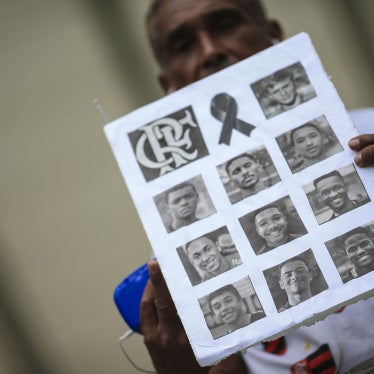Children in northern Brazil are routinely beaten by police and detained in abusive conditions, Human Rights Watch charged in a new report released today. The release comes on the 100th day of President Luiz Inácio Lula da Silva's administration
Children face violence at the hands of other youths, are unnecessarily confined to their cells for lengthy periods of time, and often do not receive the schooling to which the Brazilian constitution entitles them, Human Rights Watch said.
"President Lula has vowed to prioritize the needs of the most vulnerable," said Michael Bochenek, counsel to the Children's Rights Division of Human Rights Watch. "If he is to make good on that promise, his administration must address the systemic human rights abuses committed against detained children."
Brazil is a federation of states, much like the United States, and each state controls its own juvenile detention system. But the federal government has a key role in enforcing the national juvenile justice law. And the federal government can condition its funding of state juvenile detention systems on their compliance with human rights norms.
Human Rights Watch's 63-page report, Cruel Confinement: Abuses Against Detained Children in Northern Brazil, is based on interviews with 44 detained youth, as well as dozens of additional interviews with government officials, lawyers, social workers, and representatives of nongovernmental organizations. Human Rights Watch inspected a total of 17 detention facilities, including four girls' detention center, in the states of Amapá, Amazonas, Maranhão, Rondônia, and Pará.
Police beatings during and after arrest are common, the report found. Such abuses often occur at police stations, where Brazilian law allows children to be held for up to five days while they await transfer to a juvenile detention facility. In rural areas, where police routinely violate the five-day limit on detention in police lockups, children are at greater risk of police abuse.
Once children are transferred to detention centers, they must often endure further violence from state military police, who are charged with ensuring the external security of detention centers, quelling riots and other disturbances, responding to escape attempts, and conducting cell searches. Children who complained of beatings often reported that military police hit them with cassetetes, rubber batons with a metal core.
Girls often lack basic medical care and generally do not receive recreational opportunities on par with those afforded boys. They appeared to spend much of their recreation time sewing, engaged in other crafts, or asleep.
Human Rights Watch called on Brazil's state authorities to provide meaningful complaint mechanisms to youths in detention and fully investigate all complaints of abuse. Detention centers should take steps to protect children from abuse at the hands of other youths. State authorities should also end the routine use of cell restriction upon admission and prohibit the use of closed or solitary confinement or any other punishment that may compromise the physical or mental health of a child.
Human Rights Watch was particularly troubled by the military police's actions in response to a disturbance on April 5 and 6, 2002, in the Espaço Recomeço detention center in Pará. After a small group of youths set fire to their mattresses and attempted to escape, the center called in military police shock troops, who fired tear gas and rubber bullets to quell the disturbance. One youth told Human Rights Watch that military police aimed tear gas canisters directly at him; he had burns, blisters, bruises, and cuts over his face, neck, abdomen, arms, and legs. Other youths reported that police officers beat them with rubber batons and tree branches after they were detained.
Children also suffer violence at the hands of other youths. When Human Rights Watch interviewed Josefina S., held in the state of Amapá, she bore fresh cuts on her face, neck, and arms that she attributed to a fight with another girl.
Physical abuse is not the only human rights violation children suffer in detention. Upon entering a detention facility, children are routinely confined to their cells for five days or more with no opportunity for exercise or other activity.
Cell confinement is also used as the primary formal disciplinary measure. Human Rights Watch found that most detention centers have no clear standards or procedures for the use of cell confinement as a disciplinary measure, and there appear to be no limits on the length of time that children may be confined to their cells.
The majority of youth in detention have only completed between one and four years of primary education. Many are illiterate. Access to schooling would be particularly beneficial for these youth. But many youths do not receive an education while they are in detention, in violation of the Brazilian constitution and international law. In particular, youths who were confined to their cells frequently reported that they could not attend classes.
Most detention centers fail to investigate complaints of abuses. Officials in Manaus, capital of the state of Amazônas, were the only ones to raise the issue of abuses by guards and military police and discuss it forthrightly with Human Rights Watch. "I can't hide this," said Paulo Sampaio, the director of the Amazônas Department of the Child and the Adolescent, "because if I do, I perpetuate it."








